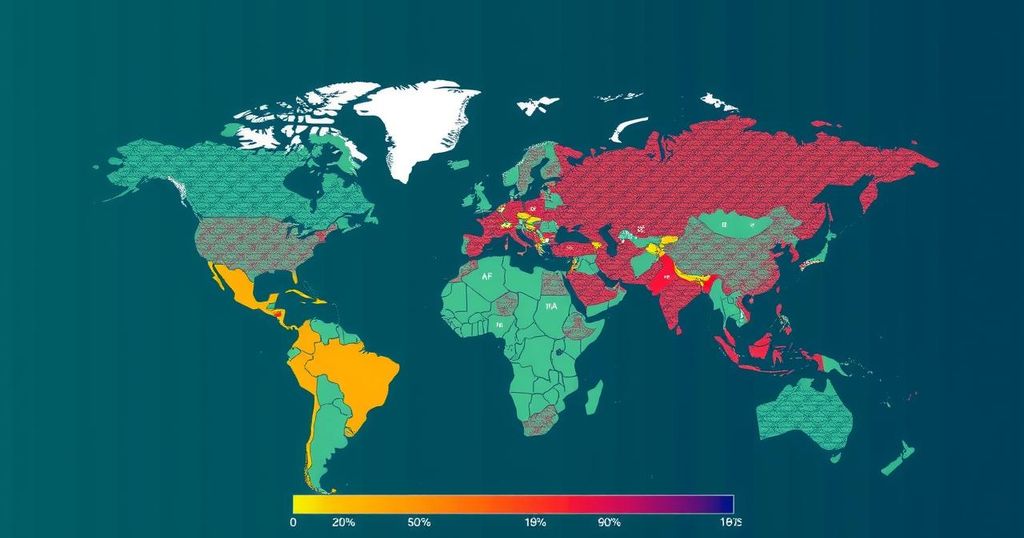Global Election Year Signals Decline in Climate Action Commitment
In 2024, numerous elections worldwide reveal a declining commitment to climate action, despite alarming climate-related disasters. Associated electoral victories for climate skeptics and rightwing parties accentuate the divergence of public priorities towards economic concerns, overshadowing urgent environmental issues. This trend, while not universal, raises significant alarm regarding the future of global climate initiatives and leadership, especially amid an increasingly unstable climate crisis.
The world is witnessing a significant regression in political commitments to combat the climate crisis as an unprecedented number of elections occur in 2024. Despite alarming evidence of escalating climate disasters, leaders who exhibit skepticism towards climate action have gained traction globally. For instance, Donald Trump, who dismisses the climate crisis, secured electoral victories, along with rightwing parties in Europe that resisted climate regulations. This trend suggests a troubling shift in public priorities, with climate-related concerns increasingly overshadowed by issues like inflation and energy prices.
In recent years, public enthusiasm for climate action appears to have diminished, exacerbated by global events such as the COVID-19 pandemic and ongoing conflicts, while catastrophic climate events persist. This paradox was articulated by political expert Catherine Fieschi, who observed that although climate change poses an existential threat, electoral priorities have shifted away from environmental issues. The current narrative has shifted from focusing on “green” initiatives to “clean” energy, reflecting a more palatable approach to voters wary of economic implications.
Despite 2024 being predicted as the hottest year on record—with numerous extreme weather events affecting Europe, Asia, and the Americas—climate change has largely remained a secondary issue in election campaigns. India presents a notable exception, where farmer protests against erratic weather conditions played a pivotal role in the reelection of Prime Minister Narendra Modi. In contrast, rightwing parties across Europe capitalized on fears surrounding the financial burden of climate initiatives during recent EU elections.
Although the United Kingdom experienced a resurgence of support for climate-friendly policies with Labour’s victory, the overall global momentum toward addressing rising temperatures seems to wane. Political scientist Jan-Werner Müller emphasized concerns over center-right parties in Europe yielding to populist pressures regarding climate policy, compromising their stance to align with voter sentiments.
The recent COP29 climate summit in Azerbaijan further illustrated the ongoing challenges faced in addressing the climate crisis, as it was marked by the attendance of only a few world leaders and a defiant stance from some participating nations regarding fossil fuel dependency. Activists expressed their dismay at the insufficient financial commitments made toward climate action by major polluters, highlighting the irony of dominant climate discussions being held in countries heavily reliant on fossil fuels.
While there remains hope for advancements in renewable energy, this year’s developments reflect diminishing optimism as the potential ramifications of a Trump presidency loom. As expressed by Müller, the situation is urgent and dire, emphasizing that “we are running out of precious time. Every day lost matters now.”
The current situation reflects a confluence of global political dynamics and environmental urgency. As major elections transpire worldwide, the commitment to addressing climate change has faltered in many regions, notably in advanced economies. The phenomenon poses a dual concern: the increasing frequency of climate disasters and the waning public eagerness to prioritize climate action amid rising populism and economic challenges. Historical context reveals that five years prior, momentum was building towards significant climate initiatives, largely influenced by youth activists like Greta Thunberg. However, recent events have shifted the political landscape, favoring those who downplay or deny the urgency of climate change.
This year has illustrated a potential reversal in global commitments to climate action as political dynamics evolve and populism gains ground. As leaders who deny the significance of the climate crisis obtain key electoral victories, the urgency of addressing this existential threat becomes obscured by economic concerns and rising energy prices. Despite some progress in renewable energy sectors, the overarching trend suggests a concerning detachment from climate commitments that could have long-term ramifications for global efforts to combat climate change.
Original Source: www.theguardian.com




Post Comment